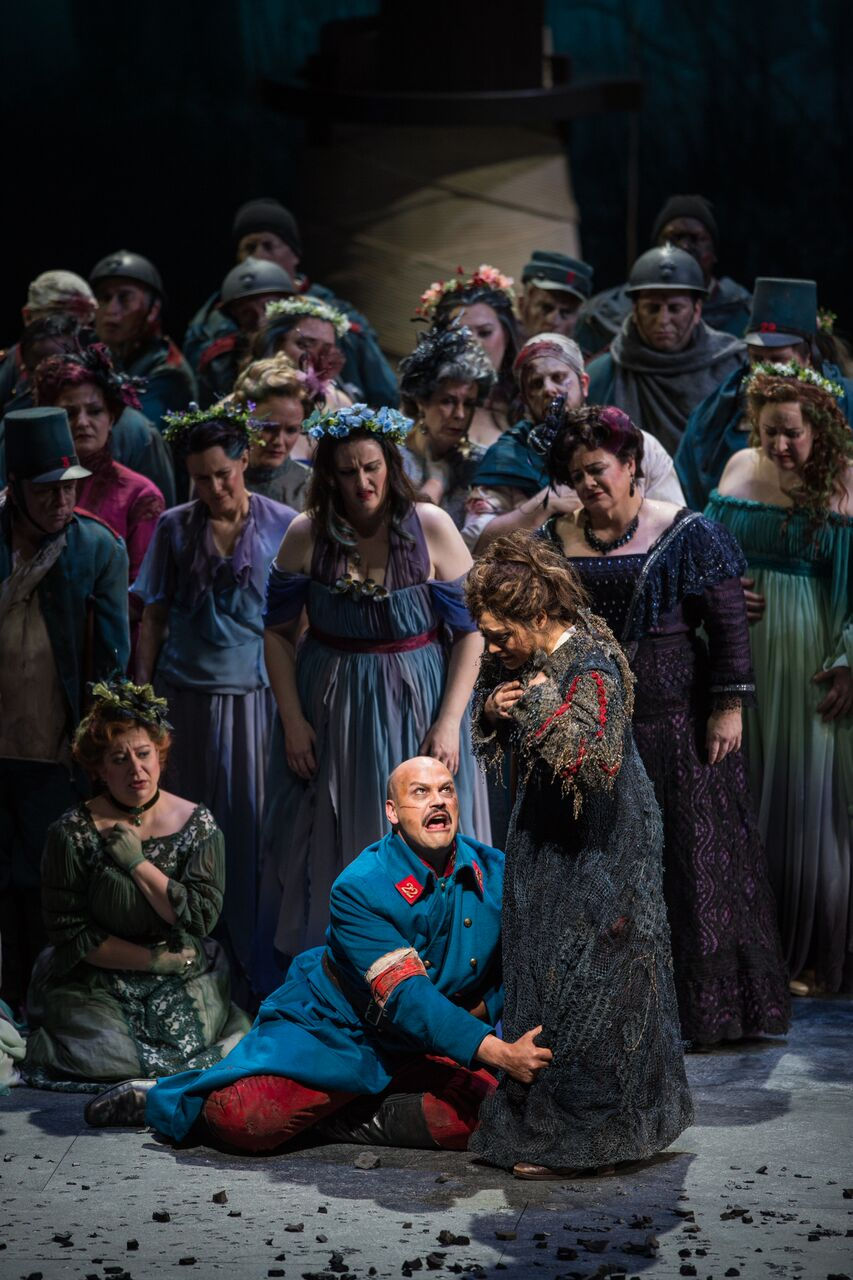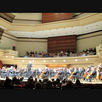Lyric Opera wraps up stunning new production of “Faust”
- Mar 20, 2018
- 6 min read

Life is tragic because it always ends in death. It is scary and sad to watch yourself wither. Not everyone can accept it, and many people don’t want to age. Some of them are even ready to sell their soul to the devil in order to stay forever young, but it comes at a price. The grand opera “Faust” by French composer Charles Gounod demonstrates what the wish to be young again can lead to. Lyric Opera of Chicago is excited to present its new production of “Faust” that has been successfully running on its stage this March and became the highlight of the season. On Wednesday, March 21, Lyric Opera will give the final presentation of “Faust.”
Everybody finds their own meaning in “Faust.” We apply our personal life experience to what we see and hear on stage, put it through our heart and soul, and create our own understanding of this everlasting drama. “Charles Gounod’s ‘Faust’ is, for many of us, like a beloved friend whose reappearance in our lives we welcome with joy. For others in the audience, this opera will be an exciting new discovery. Whatever your experience of ‘Faust,’ it will give you what everyone craves above all in the opera house – glorious music and riveting theater,” said Lyric Opera’s General Director, President and CEO Anthony Freud.
This story is about Faust, an aging artist, who believes that he wasted his life and at first wants to end it but then wishes to become young again. He curses human happiness and faith and angrily calls upon Satan to assist him. To his terror, Méphistophélès, the messenger of the devil, appears and offers Faust his service. Faust asks him to make him young again to experience all the youthful pleasures and joys. Méphistophélès agrees, but sets a price – he will serve Faust on Earth, but Faust would have to serve him later on. Faust turns into a young man and falls in love with an innocent young woman Marguerite. She eventually falls in love with him too, but happiness can’t be built on lies and deals made with Satan. Their love leads to catastrophic consequences to both of them, but at the end Marguerite’s soul is saved and rises to heaven.
“Faust” premiered in Paris on March 19, 1859. This opera was Gounod’s first great success which established his international reputation. The work shows the composer’s ability to demonstrate the whole spectrum of human emotions and feelings through the sounds of music – love, despair, anger, forgiveness, hope, remorse, and many others. It has both light and dark colors, but mostly it is a very touching, philosophical and deep composition that contemplates about the sense of life, the meaning of death, morality and everlasting values. Memorable and extremely touching melodic lines, emotional arias, chorus parts and the beautiful orchestral arrangement together create an unforgettable masterpiece that makes you think, wonder, cry and believe.
Lyric Opera of Chicago has presented “Faust” many times before. However, this coproduction with Portland Opera is an absolutely new version of this compelling opera. Besides the undoubtedly colorful music by Gounod and libretto by Jules Barbier and Michel Carré based on Carré’s “Faust et Marguerite” and Goethe’s “Faust,” this magnificent new production presents the talents of bright contemporary designers, artists and directors. Emotional projections, dramatic design sets and scenery give extremely rich and powerful support to the soloists, the chorus and the orchestra, and together they reach unbelievable artistic and theatrical goals.
“I’m thrilled that we’re able to present this familiar favorite in a magnificent new production. It marks the eagerly awaited theatrical debut of John Frame, recognized internationally as one of the most brilliantly innovative sculptors of his generation. As production designer, John is part of a truly exceptional team that also includes director Kevin Newbury (whose Lyric credits include ‘Anna Bolena,’ ‘Norma,’ and the world premiere of ‘Bel Canto’), set and costume designer Vita Tzykun, lighting designer Duane Schuler, and projection designer David Adam Moore. All of these superb artists have created a provocative new view of ‘Faust’ while at the same time remaining utterly true to the spirit of the work.”
The cast for this production is carefully chosen and is impressive. The role of Faust is presented by the extraordinary gifted young French tenor Benjamin Bernheim, for whom this role became an American debut. His brilliant presentation of Faust impresses with the first sounds of his tender and strong voice. Aria “Salut o mon dernier matin” in Act 1 demonstrates all the dramatism and lyricism of Bernheim’s voice, while aria “Quel trouble inconnu me penêtre” in Act 3 shows not only the brilliance of his voice, but also its wide diapason, especially at the end of this aria where Bernheim easily and masterfully takes long and really high notes. The Chicago audience already fell in love with this acclaimed tenor who is a noticeable figure in the European opera world. Now, he is a well-recognized singer in the United States as well.
World-renowned Chicago-born soprano Ailyn Pérez stars as Marguerite in this new production of “Faust,” with the internationally celebrated Puerto Rican-born soprano Ana María Martínez taking over this role on March 21. Both singers are in demand at the world’s leading opera houses and cultural capitals. Success in the opera world requires not only talent, but also hard work and devotion to profession, which both Pérez and Martínez fully possess.
The role of Marguerite is difficult both vocally and artistically. However, Pérez, who presented Marguerite from March 3 to March 18, found the best way to portray the main heroine and to demonstrate all the changes that Marguerite went through – from being an innocent girl seduced by Faust to a mad woman who killed her baby, was put to jail, but confessed to God and saved her soul at the end. Her tender and sincere voice impressed the audience, and each aria became another gem in this powerful production, including the two famous arias “Il était un roi de Thulé” (The King of Thule) and “Ah! je ris de me voir si belle en ce miroir” (the Jewel Song). Martínez, who has already presented eight roles at Lyric Opera, will impress the audience on March 21 with her strong and touching voice and brilliant presentation.
The American bass-baritone Christian Van Horn, a Ryan Opera Center alumnus, became the best match for the role of Méphistophélès. His Méphistophélès is handsome, confident, cynic and skillful. Van Horn’s outstanding artistic skills combined with the depth of his beautiful bass-baritone voice are heard in every aria of Méphistophélès and make the audience shiver and engage in a scary, yet seductive dance with Satan. Especially powerful is aria “Le veau d'or est toujours debout” in Van Horn’s presentation. His strong and flexible voice is greatly appreciated and praised by the audience, and his undoubted artistic mastership underlines his talent as a soloist.
The role of Valentin, Marguerite’s brother and a soldier, is brilliantly presented by Pennsylvania-born baritone Edward Parks, for whom this production became his Lyric debut. This young, yet talented soloist is well-known around the United States and has performed at Metropolitan Opera, Atlanta Opera, Lyric Opera of Kansas City, Nashville Opera and many others. He got international recognition at Spain’s Ópera de Oviedo and at Opéra de Monte-Carlo. His presentation of Valentin, Marguerite’s passionate brother, demonstrates all the richness of his voice and delights the public with its sensitivity and fullness.
The role of Siébel, a young boy who fell in love with Marguerite and who protected her when her brother went to war, is performed by the Connecticut native mezzo-soprano Annie Rosen, a Ryan Opera Center alumna. Her role is touching and sincere, yet full of inner power and wisdom. Rosen demonstrates her outstanding vocal skills as well as beautiful artistic skills portraying young and sensitive Siébel. The American mezzo-soprano Jill Grove successfully portrays Marthe, Marguerite’s neighbor, with sense of humor and great vocal mastership. Emmett O’Hanlon, the American baritone and a second-year Ryan Opera Center member, demonstrates Wagner, a student, with brilliance and artistry.
It is also extremely important to note the role of Lyric Opera Chorus under the direction of Chorus Master Michael Black. Without this enthusiastic and extremely professional group of singers Lyric Opera’s productions wouldn’t be possible. French conductor Emmanuel Villaume, who has been consistently acclaimed for appearances with the most prominent opera companies and symphony orchestras around the world, made this production truly French. He feels this music so deeply that his participation in this production became a must. As Anthony Freud noted, “At Lyric we’ve been fortunate indeed to have Emmanuel Villaume on the podium for many French works. It’s inestimably valuable to our cast, chorus, and orchestra to have the benefit of Emmanuel’s immaculate sense of style, so essential to any performance of French romantic repertoire.”
Lyric Opera of Chicago chose the perfect time to present "Faust," just before Easter. At the end of the opera, a chorus of angels sings "Christ est ressuscité!" (Christ is risen!). The finale of the opera is really powerful and demonstrates the salvation of a lost and broken soul. Marguerite dies, but her soul is saved. Life is tragic because it always ends in death, but it is beautiful because there is a way to be saved; saved through strong spirit, inner wisdom and faith in God.
Natalia Dagenhart
Photo: Courtesy of Andrew Cioffi

























Comments